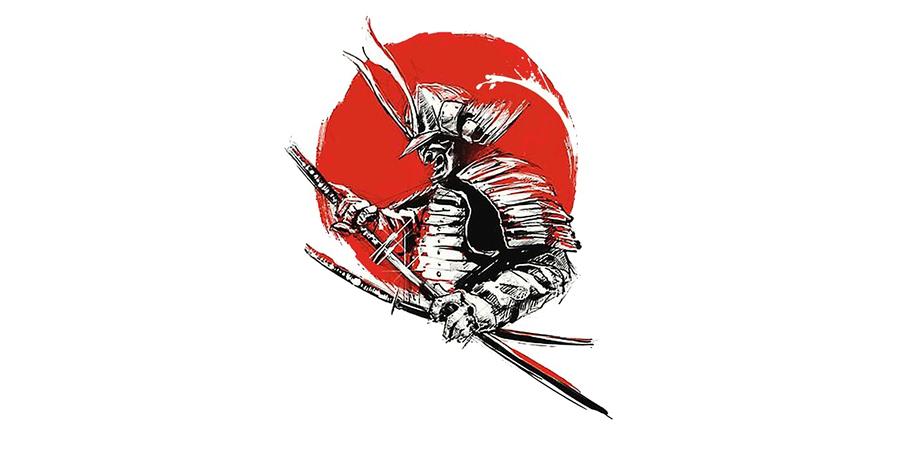The ancient warrior culture of Japan produced a sophisticated martial philosophy that we know today as Bushido—the Way of the Warrior. There are eight virtues of Bushido, the code of the samurai: justice, courage, benevolence, politeness, sincerity, honor, loyalty, and self-control. These virtues comprise the essence of Japanese cultural beliefs, which are still present today.
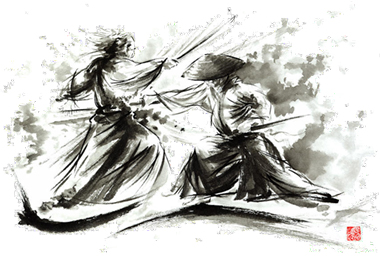
Dating back to the feudal era, samurai first began as armed imperial guards, but would later be regarded as one of Japan’s highest social castes. Also known as “warrior nobility,” samurai were part of Japan’s ruling class for over five centuries.
What’s more, samurai are still relevant today, appearing in anime, comics, movies, novels, video games, etc. Known for their iconic armor, katana (samurai sword), and swift fighting style, as well as their disciplined way of life, samurai are as recognizable as they are popular.
Bushido
Bu-shi-do means literally Military-Knight-Ways—the ways which fighting nobles should observe in their daily life as well as in their vocation; in a word, the “Precepts of Knighthood,” the noblesse oblige of the warrior class.
Bushido, is the code of moral principles which the knights were required or instructed to observe. It is not a written code; at best it consists of a few maxims handed down from mouth to mouth or coming from the pen of some well-known warrior or savant. More frequently it is a code unuttered and unwritten, possessing all the more the powerful sanction of veritable deed, and of a law written on the fleshly tablets of the heart. It was founded not on the creation of one brain, however able, or on the life of a single personage, however renowned. It was an organic growth of decades and centuries of military career. It, perhaps, fills the same position in the history of ethics that the English Constitution does in political history; yet it has had nothing to compare with the Magna Charta or the Habeas Corpus Act.
In Japan as in Europe, when feudalism was formally inaugurated, the professional class of warriors naturally came into prominence. These were known as samurai, meaning literally, like the old English cniht (knecht, knight), guards or attendants—resembling in character the soldurii, whom Caesar mentioned as existing in Aquitania, or the comitati, who, according to acitus, followed Germanic chiefs in his time; or, to take a still later parallel, the milites medii that one reads about in the history of Mediaeval Europe.
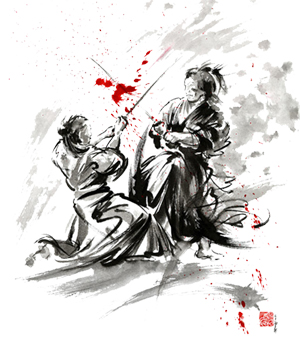
A Sinico-Japanese word Bu-kי or Bu-shi (Fighting Knights) was also adopted in common use. They were a privileged class, and must originally have been a rough breed who made fighting their vocation. This class was naturally recruited, in a long period of constant warfare, from the manliest and the most adventurous, and all the while the process of elimination went on, the timid and the feeble being sorted out, and only “a rude race, all masculine, with brutish strength,” to borrow Emerson’s phrase, surviving to form families and the ranks of the samurai.
Coming to profess great honor and great privileges, and correspondingly great responsibilities, they soon felt the need of a common standard of behavior, especially as they were always on a belligerent footing and belonged to different clans.
If fighting in itself, be it offensive or defensive, is, as Quakers rightly testify, brutal and wrong, we can still say with Lessing, “We know from what failings our virtue springs.” “Sneaks” and “cowards” are epithets of the worst opprobrium to healthy, simple natures. Childhood begins life with these notions, and knighthood also; but, as life grows larger and its relations many sided, the early faith seeks sanction from higher authority and more rational sources for its own justification, satisfaction, and development. If military systems had operated alone, without higher moral support, how far short of chivalry would the ideal of knighthood have fallen! In Europe, Christianity, interpreted with concessions convenient to chivalry, infused it nevertheless with spiritual data. “Religion, war, and glory were the three souls of a perfect Christian knight,” says Lamartine. In Japan there were several sources of Bushido.
Sources of Bushido
I MAY BEGIN with Buddhism. It furnished a sense of calm trust in Fate, a quiet submission to the inevitable, that stoic composure in sight of danger or calamity, that disdain of life and friendliness with death. A foremost teacher of swordsmanship, when he saw his pupil master the utmost of his art, told him, “Beyond this my instruction must give way to Zen teaching.” “Zen” is the Japanese equivalent for the Dhyâna, which “represents human effort to reach through meditation zones of thought beyond the range of verbal expression.”1 Its method is contemplation, and its purport, so far as I understand it, to be convinced of a principle that underlies all phenomena, and, if it can, of the Absolute itself, and thus to put oneself in harmony with this Absolute. Thus defined, the teaching was more than the dogma of a sect, and whoever attains to the perception of the Absolute raises himself above mundane things and awakes “to a new Heaven and a new Earth.” What Buddhism failed to give, Shintoism offered in abundance. such loyalty to the sovereign, such reverence for ancestral memory, and such filial piety as are not taught by any other creed, were inculcated by the Shinto doctrines, imparting passivity to the otherwise arrogant character of the samurai. Shinto theology has no place for the dogma of “original sin.”
On the contrary, it believes in the innate goodness and Godlike purity of the human soul, adoring it as the adytum from which divine oracles are proclaimed. Everybody has observed that the Shinto shrines are conspicuously devoid of objects and instruments of worship, and that a plain mirror hung in the sanctuary forms the essential part of its furnishing.
The presence of this article is easy to explain: it typifies the human heart, which, when perfectly placid and clear, reflects the very image of the Deity. When you stand, therefore, in front of the shrine to worship, you see your own image reflected on its shining surface, and the act of worship is tantamount to the old Delphic injunction, “Know thyself.” But selfknowledge does not imply, either in the Greek or Japanese teaching, knowledge of the physical part of man, not his anatomy or his psychophysics; knowledge was to be of a moral kind, the introspection of our moral nature.
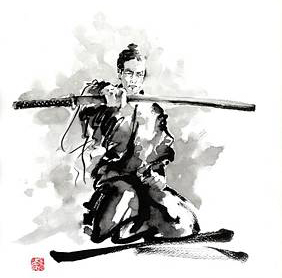
Mommsen, comparing the Greek and the Roman, says that when the former worshipped he raised his eyes to Heaven, for his prayer was contemplation, while the latter veiled his head, for his was reflection. Essentially like the Roman conception of religion, our reflection brought into prominence not so much the moral as the national consciousness of the individual. Its natureworship endeared the country to our inmost souls, while its ancestorworship, tracing from lineage to lineage, made the Imperial family the fountain-head of the whole nation.
As to strictly ethical doctrines, the teachings of Confucius were the most prolific source of Bushido. His enunciation of the five moral relations between master and servant (the governing and the governed), father and son, husband and wife, older and younger brother, and between friend and friend, was but a confirmation of what the race instinct had recognized before his writings were introduced from China. The calm, benignant and worldly-wise character of his politico-ethical precepts was particularly well suited to the samurai, who formed the ruling class. His aristocratic and conservative tone was well adapted to the requirements of these warrior statesmen.
Next to Confucius, Mencius exercised an immense authority over Bushido. His forcible and often quite democratic theories were exceedingly taking to sympathetic natures, and they were even thought dangerous to, and subversive of, the existing social order, hence his works were for a long time under censure. Still, the words of this mastermind found permanent lodgment in the heart of the samurai.
The writings of Confucius and Mencius formed the principal textbooks for youths and the highest authority in discussion among the old. A mere acquaintance with the classics of these two sages was held, however, in no high esteem. A common proverb ridicules one who has only an intellectual knowledge of Confucius, as a man ever studious but ignorant of Analects.
A typical samurai calls a literary savant a book-smelling sot. Another compares learning to an ill-smelling vegetable that must be boiled and boiled before it is fit for use. A man who has read little smells a little pedantic, and a man who has read much smells yet more so; both are alike unpleasant. The writer meant thereby that knowledge becomes really such only when it is assimilated in the mind of the learner and shows in his character. An intellectual specialist was considered a machine. Intellect itself was considered subordinate to ethical emotion. Man and the universe were conceived to be alike spiritual and ethical. Bushido could not accept the judgment of Huxley, that the cosmic process was unmoral.
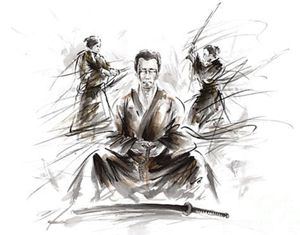
Bushido made light of knowledge of such. It was not pursued as an end in itself, but as a means to the attainment of wisdom. Hence, he who stopped short of this end was regarded no higher than a convenient machine, which could turn out poems and maxims at bidding. Thus, knowledge was conceived as identical with its practical application in life; and this Socratic doctrine found its greatest exponent in the Chinese philosopher, Wan Yang Ming, who never wearies of repeating, “To know and to act are one and the same.”
If history can teach us anything, the state built on martial virtues be it a city like Sparta or an Empire like Rome—can never make on earth a “continuing city.” Universal and natural as is the fighting instinct in man, fruitful as it has proved to be of noble sentiments and manly virtues, it does not comprehend the whole man. Beneath the instinct to fight there lurks a diviner instinct—to love. We have seen that Shintoism, Mencius, and Wan Yang Ming, have all clearly taught it; but Bushido and all other militant types of ethics, engrossed doubtless, with questions of immediate practical need, too often forgot duly to emphasize this fact. Life has grown larger in these latter times.
The importance of samurai and local armies was greatly reduced following the stabilising policies of the Tokugawa Shogunate which brought relative peace across Japan. This continued the process begun half a century earlier when the rural populace was disarmed. In addition, many samurai, faced with becoming either peaceful farmers or retainers to local lords when there was no warfare to speak of, consequently, became teachers, administrators (especially in finance), and moral guides. Samurai still enjoyed an elevated social status, being members of the shi rank, which placed them above merchants, artisans, and farmers within the shi-no-ko-sho ranking system. In 1872 CE conscription was reintroduced, and in 1876 CE the samurai were formally disestablished, although descendants of former samurai continued to be distinguished with the title of shizoku up to the Second World War.
When the conditions of society are so changed that they have become not only adverse but hostile to Bushido, it is time for it to prepare for an honorable burial. It is just as difficult to point out when chivalry dies, as to determine the exact time of its inception. Dr. Miller says that chivalry was formally abolished in the year 1559, when Henry II of France was slain in a tournament. With us, the edict formally abolishing feudalism in 1870 was the signal to toll the knell of Bushido.The edict, issued five years later, prohibiting the wearing of swords, rang out the old, “the unbought grace of life, the cheap defence of nations, the nurse of manly sentiment and heroic enterprise,” it rang in the new age of “sophisters, economists, and calculators.”
- This article is an excerpt from the book:
- Samurai Wisdom Lessons from Japans Warrior Culture by Thomas Cleary and
- Samurai ( worldhistory.org )

